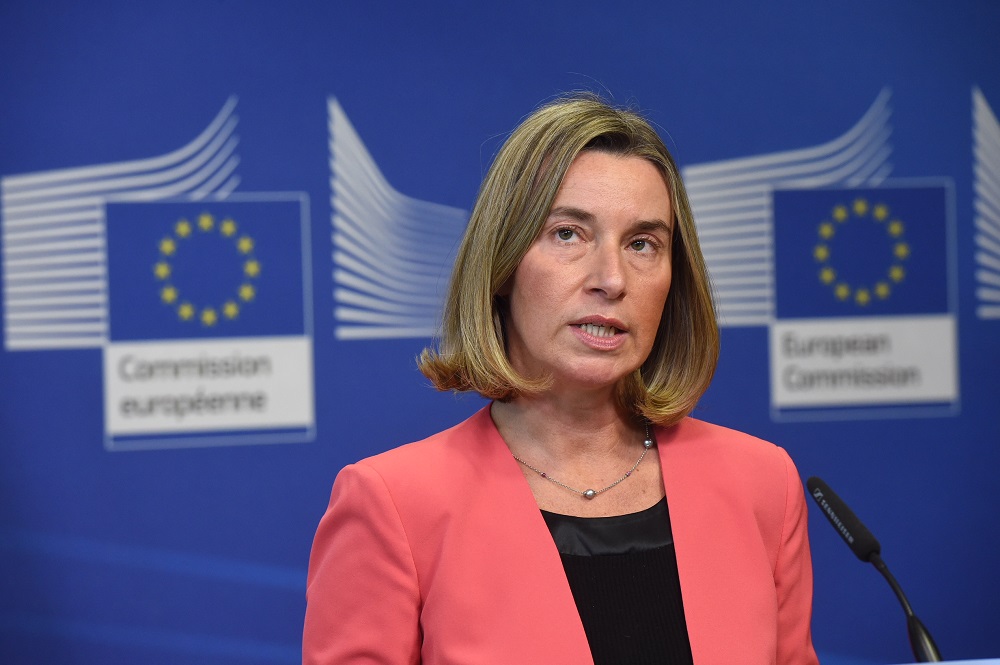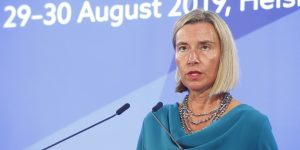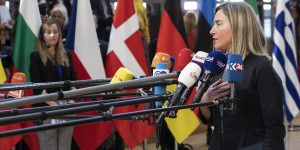Check against delivery!
Thank you very much.
Let me start by an unusual apology. Together with Commissioner [for European Neighbourhood Policy and Enlargement Negotiations, Johannes] Hahn we had planned to brief the AFET [Affaires étrangères] committee before the press conference; due to a little bit of delay in the College, this has been impossible. So I start with a sort of institutional apology to the AFET committee through public and media channels. Thank you for allowing us this.
Today, the College adopted its annual Enlargement package with seven individual reports for the Western Balkans partners and Turkey. In the package, we are assessing the implementation of the European Union’s Enlargement policy, in an extremely detailed way. As the package reconfirms, the European Union enlargement policy is for us an investment. First of all, an investment in peace, in security, in prosperity and in the stability of Europe.
It is our own interest to have a successful Enlargement policy. It provides increased economic and trade opportunities to the mutual benefits of the European Union and the countries aspiring to join. It is also a very important factor that drives transformation in countries and societies, and increases stability and security in the countries concerned. The process itself is built on very clearly established criteria, and fair and strict conditionality. Therefore each country and partner is assessed on the basis of its own merits, also to provide specific incentives to drive the reforms forward.
I will leave the details to Commissioner Hahn, but I will say a few words on the Western Balkans, since I am also travelling to the region once again tonight, heading to Tirana, Skopje, Podgorica and Belgrade in the next – I am afraid – two days. I have said it many times, we have said it many times: the Western Balkans are Europe and will be part of the European Union’s future, of a stronger, stable and united European Union. And it is a matter of shared interest and shared responsibility with the countries of the region, for the benefit of all our citizens, inside and outside the Union.
This is the moment in which we recognise positive change in order to make irreversible progress towards the European Union. We have strengthened our engagement with the region from our side, through the Western Balkan Strategy, with a very important visit President [of the European Commission, Jean-Claude] Junker paid to the region, and we are now preparing with the Bulgarian Presidency the EU-Western Balkans Summit in Sofia, that is not about enlargement but still is going to be a very important moment for the region.
Our commitment and engagements are clear and unequivocal. Let me say that over the past year and beyond, partners from the region have delivered very important reforms across the board and have modernised their economies. Out of six Western Balkan partners two, Montenegro and Serbia, have progressed well in the negotiations. Today, the Commission recommends that the Council decides to open accession negotiations with Albania and with the former Yugoslav Republic of Macedonia. We are also working towards an opinion on Bosnia and Herzegovina’s application and with Kosovo’s authorities we are working on further progress on the basis of the Stabilisation and Association Agreement we have. And of course we continue – I personally continue – to facilitate the dialogue on normalisation of relations between Belgrade and Pristina, including on the achievement of a legally binding agreement. Obviously, this is a process.
So maintaining and deepening the current reforms must – and I am sure will – continue in all areas in all the partner countries, in particular in the fundamental areas of the rule of law, human rights, democratic institutions and public administration reform, as well as on economic development and competitiveness – in all areas where structural shortcomings are still identified. Countries must – and I am sure will – ensure that the reforms are properly implemented and that they demonstrate a track record of concrete results, not because Brussels asks, but because this is what the people of the region, the citizens, are expecting from their institutions and their leaderships. And we have seen determined, committed political leaderships in this respect.
We will continue to support this work through policy support and through focused financial assistance. And I have to say over the last three years we have seen results that were clearly considered impossible to be achieved when we started our mandate. So this is not the time for acknowledging this and saying the boxes have been ticked, that is it. No, this is the way to invest even more energy and determination in the path of deep reforms – courageous reforms – that bring benefits to the citizens and to the region as a whole. Because in particular when we talk about the enlargement policy for the Balkans – I think I had the chance of seeing this already publicly – we go back to the real meaning of the project of the European Union, which is providing instruments for reconciliation and peace in our continent.
So I believe the months and years ahead will be equally intense. Challenges will be there as always – as always in Europe, as always in the Balkans. But as we have managed in the past three years and a half, I believe that our joint commitment, our joint determination, our joint energy and the support of our people will allow us to make further progress in a common direction. Thank you.




